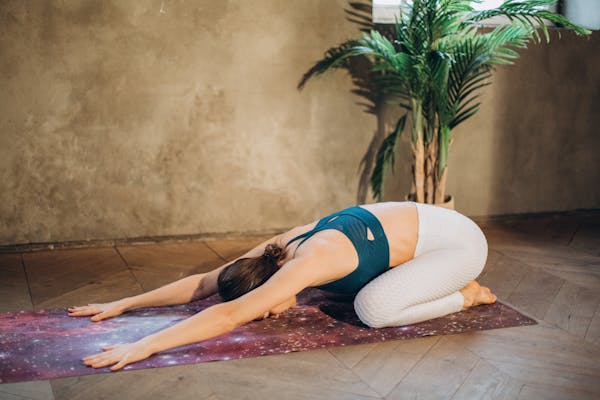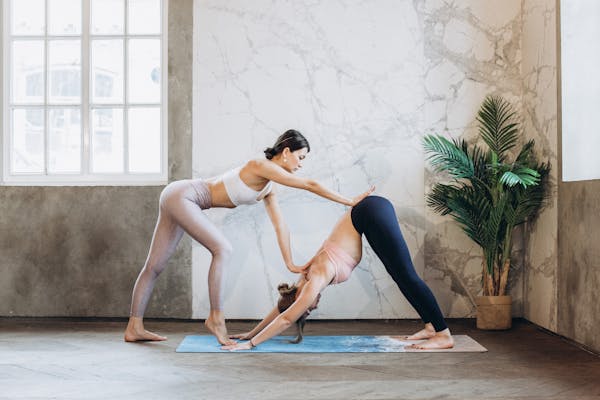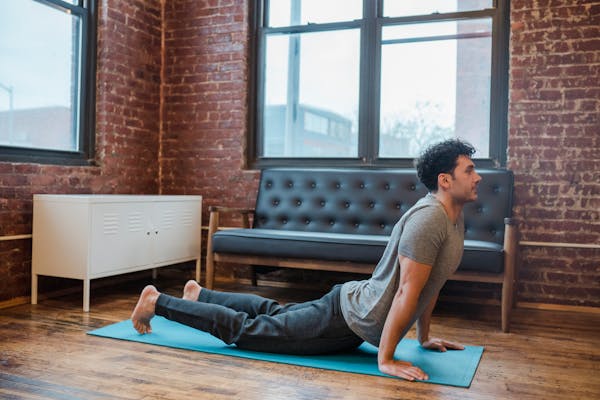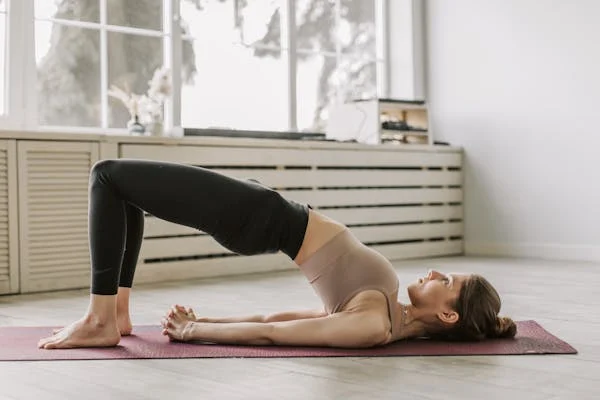Table of Contents
Introduction
Lower back strain Yoga is one of the most frequent causes of pain, especially in today’s age and time of sedentary lifestyle. Whether it is slouching, sitting for extended periods of time, or improper lifting, lower back pain can have a drastic impact on your quality of life.
But fear not, as Lower Back Strain Yoga is a natural and effective way of pain relief, improvement in mobility, and long-term healing. In this blog, we are going to be talking about the best yoga poses for back strain, their benefits, and how to incorporate them in your daily life.
Understanding Lower Back Strain
What is Lower Back Strain?
Lower back strain is the overstretching or tearing of muscles or ligaments in the lower region of the back. It is caused due to overuse, bad posture, heavy lifting, or sudden awkward movement. Symptoms include pain, stiffness, and limited mobility, all of which greatly hamper normal activity.
Causes of Lower Back Strain
Poor Posture: Sitting for long periods of time with poor posture causes the body to lose its alignment and strains the lower back muscles.
Sedentary Lifestyle: The back muscles that stabilize the spine get weak due to disuse, so it becomes more prone to strain.
Incorrect Lifting: Heavy lifting without the correct lifting technique can subject the lower back to excessive stress.
Overexertion: Physical exertion without adequate warm-up or stretching can cause muscle strain.
Symptoms of Lower Back Strain
Pain in the lower back region
Muscle stiffness or tightness
Difficulty in bending or twisting
Range of motion limited
Pain that is aggravated by movement or sitting for long periods of time
The Role of Yoga in Lower Back Strain Recovery
Yoga has been a tried and tested method for healing body pain and overall well-being. Yoga for back strain in particular targets building muscles, flexibility, and spinal alignment. It also targets conscious breathing and relaxation, which calm tension and stress in the body.
Why Yoga Works for Lower Back Pain
Improves Flexibility: Most lower back problems are caused by tight muscles. Yoga poses stretch and lengthen the muscles, easing tightness and pain.
Strengthens Core and Back Muscles: A strong core gives the spine greater support, easing strain on the lower back.
Corrects Posture: Yoga promotes conscious body awareness, and you can easily keep good posture in daily life.
Reduces Stress: The relaxation and breathing techniques in yoga can actually help manage stress associated with lower back pain.
Best Yoga Poses for Lower Back Strain
Here are some of the best yoga poses that can ease lower back strain and assist your recovery:
1. Child’s Pose (Balasana)
Benefits:
Stretches the spine, hips, and thighs.
Relaxes tension on the lower back as well as on the neck.
Promotes relaxation and relieves stress.
How to Do:
Start on hands and knees, with the big toes together and the knees wide apart.
Sit back onto your heels and stretch your arms forward, bringing your forehead to the mat.
Hold for 30 seconds to 1 minute, breathing deeply and relaxing into the stretch.

2. Cat-Cow Pose (Marjaryasana-Bitilasana)
Benefits:
Gently mobilizes the spine
Improves flexibility in the back and neck
Reduces stiffness and promotes spinal health
How to Perform:
Start in a tabletop position with your wrists directly under your shoulders, and knees under your hips.
Inhale to a widened posture with your back, lifting your tailbone and head (Cow Pose).
Exhale to a rounded position, bringing your chin and tailbone towards each other (Cat Pose).
Flow through these two poses for 1-2 minutes.
3. Downward Dog (Adho Mukha Svanasana)
Benefits:
Stretches the hamstrings, calves, and back
Strengthens the core and back muscles
Improves spinal alignment
How to Do:
Lie on your belly.
Bring your hips up towards the ceiling, straighten your legs and form an inverted V.
Root your hands and feet. Press your chest towards your thighs.
Take a moment to settle into the pose, holding it for about 30 seconds to a minute. Remember to breathe deeply, letting each breath fill you up and help you relax. Enjoy this time to connect with your body and mind.


4. Sphinx Pose (Salamba Bhujangasana)
Benefits:
Strengthens the lower back and glutes
Opens the chest and shoulders
Improves spinal alignment
How to Perform:
Find a comfortable spot and lie down on your belly, stretching your legs out behind you. Take a moment to feel the support of the ground beneath you and let your body relax into the position.
Lie on your belly with your forearms on the ground and your elbows directly under your shoulders.
Lift your chest and head off the ground, engaging your lower back muscles.
Take a moment to settle into the pose, holding it for about 30 seconds to a minute. Remember to breathe deeply, letting each breath fill you up and help you relax. Enjoy this time to connect with your body and mind.


5. Bridge Pose (Setu Bandhasana)
Benefits:
Strengthens the glutes, lower back, and core muscles
Stretches the hips and lower back
Relieves tension in the spine and improves posture
How to Do:
Please lie on your back with your knees bent and the feet on the surface of the floor approximately hip apart.
Begin to push through your feet and then lift the hips up towards the ceiling.
Hold for 30 seconds to 1 minute, engaging your core and glutes.


6. Pigeon Pose (Eka Pada Rajakapotasana)
Benefits:
Stretches the hip flexors, glutes, and lower back
Reduces tension in the hips, which can cause lower back strain
Improves flexibility and range of motion
Start on your hands and knees. Gently bring one knee forward and position it behind your wrist. This movement helps create a comfortable foundation for your practice. As you do this, take a moment to feel the stretch in your hips and the grounding sensation beneath you.
It’s a simple yet effective way to prepare your body for the next pose, allowing you to connect more deeply with your breath and the present moment.
Extend the opposite leg straight back.
Lower your hips down towards the mat. Keep your back leg straight and strong while bending your front leg at a 90-degree angle. Feel the stretch and stability in your body as you settle into this position.
You must hold for 30 seconds to 1 minute on each side.
How to Put Lower Back Strain Yoga into Practice
To effectively treat Lower Back Strain Yoga, practice regularly and align properly. Here’s how you can incorporate yoga into your life:
1. Start Slow
If you are a beginner to yoga or have acute back pain, start with less intense poses and gradually increase the intensity.
2. Focus on Alignment
Alignment is most critical in yoga. Through improper alignment, your back pain will increase. Use props such as blocks and straps for support if needed.
3. Breath Awareness
Conscious and deep breathing releases tension in the body. Slow and deep breathing is to be done ideally when one is holding stretches.
4. Consistency is Key
Practice yoga for back strain regularly. Do these 3-4 times a week to derive benefits maximally on both sides – mobility and pain reduction.
5. Combine With Other Therapies
Experiment using yoga along with other therapy services such as physiotherapy, massage therapy, or even a chiropractic practitioner to provide holistic care towards healing.
Tips for the Healthy Lifestyle for Preventing Strained Lower Backs
As great as the technique of recovery may be from a yoga exercise program, good habits in one’s lifestyle also have the effect of preventing another accident. These include:
1. Maintain good postures.
Be aware of your posture throughout the day. Sit with a straight back, avoid slouching, and use ergonomic furniture when available.
2. Strengthen Your Core
A strong core stabilizes the spine. Incorporate core-strengthening exercises in your routine.
3. Stay Active
Regular exercise keeps the muscles strong and supple. Incorporate walking, swimming, or low-impact exercises to keep your back in top shape.
4. Practice Proper Lifting
Always lift at the knees, never the waist, and don’t twist your spine.
5. Stretch Frequently
Stretch regularly to stay flexible and avoid muscle stiffness.
Conclusion
Lower Back Strain Yoga is a great way to ease pain, increase flexibility, and encourage long-term healing. By performing special yoga poses that focus on alignment and incorporating healthy lifestyle habits, you can prevent and manage lower back strain.
Not only does yoga benefit the body, but it also calms the mind, encouraging the ease of stress and deeper connection between the mind and body.
Listen to your body, practice mindfully, and seek professional direction when needed. From injury rehabilitation to overall back wellness, yoga is a great ally on the road to healing.
